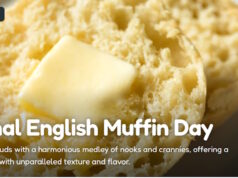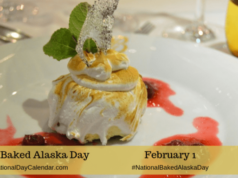
There is a period during the day when joy, that draught of liquid happiness, can be bought at a discount. Every bar in the world honors it, and every patron waits for it to enjoy their drinks with the knowledge of a purse not quite so much lighter as it might have been otherwise. In the best of establishments, the name itself is a misnomer, as it lasts for two or more, giving us all a chance to find that joy for a pittance. Happy Hour Day celebrates this time and the moments of pure bliss it brings to its patrons.
- You can thank Shakespeare for the name. In 1599, in Henry V, King Henry says, “Therefore, my lords, omit no happy hour that may give furtherance to our expedition,” which translates: “My dudes, let’s not skimp on any good times that could help us get to where we’re going.”
- When you say “happy hour,” you’re really just talking like a sailor. It’s thought that the modern use of the term began in the Navy during the 1920s when it was sea-grunt slang for time away from duty, which was typically spent either boxing or wrestling.
- The weekly entertainment program called “Happy Hour” was created aboard the USS Arkansas to help relieve the boredom of being at sea. There were a variety of activities during this time, including boxing and wrestling matches, music, and dancing. These programs grew more and more popular and by the end of World War I, “Happy Hours” were being held throughout the entire Navy.
- Over the years, the term became more about drinking than entertaining. According to a 1959 Saturday Evening Post article detailing the lives of government contractors and military personnel in the Caribbean, it was a term used for afternoon drinks in a bar.
- The act of happy hour drinking became a thing when drinking was illegal. It wasn’t until Prohibition that having a pre-dinner cocktail became en vogue. Eventually, the naval slang and trendy start-time merged.
- Rhode Island is responsible for that merger. According to the Oxford English Dictionary, a 1961 article in the Providence Journal sparked wide use of the term, when it referred to some Newport cops and their “happy hour at the cocktail bar.”
- According to a 2014 study done by American Express and Technomic, 59% of happy-hour attendees prefer domestic beer. On the other hand, only 9% reported preferring whatever beer was cheapest.
- While Prohibition played an important role in the development of what we know as happy hour, it wasn’t until the 1960s that the term was actually adopted by civilians following an article on military life in The Saturday Event Post in 1959. And by the mid-sixties, restaurants began exploring and experimenting with their version of “happy hour specials.”
- On December 11, 1984, Massachusetts became the first state to ban happy hours. there is a law that disallows the sale of reduced-price alcoholic beverages during a specified time period. That’s what they mean by “banning happy hour.” Several other states did similar laws.
- Happy Hour is Illegal in Eight States: Massachusetts, Alaska, Indiana, North Carolina, Oklahoma, Rhode Island, Utah, and Vermont.
- According to Nielsen: U.S. bars and restaurants generate 60.5% of their average weekly sales from Happy Hour—just 15 hours of the total business week. The average happy hour check in the U.S. is $68.99 (after discounts), including food and drinks, which is $8 more than the average check during other daypart occasions.
- Nielsen data shows that Wednesday Happy Hour traffic is an average of 23.9% higher than other weekdays. This makes Wednesday’s Happy Hour the fourth most valuable day part for bars and restaurants, with the same daypart for Saturday and Friday coming in first and second place, respectively.
Sources:












